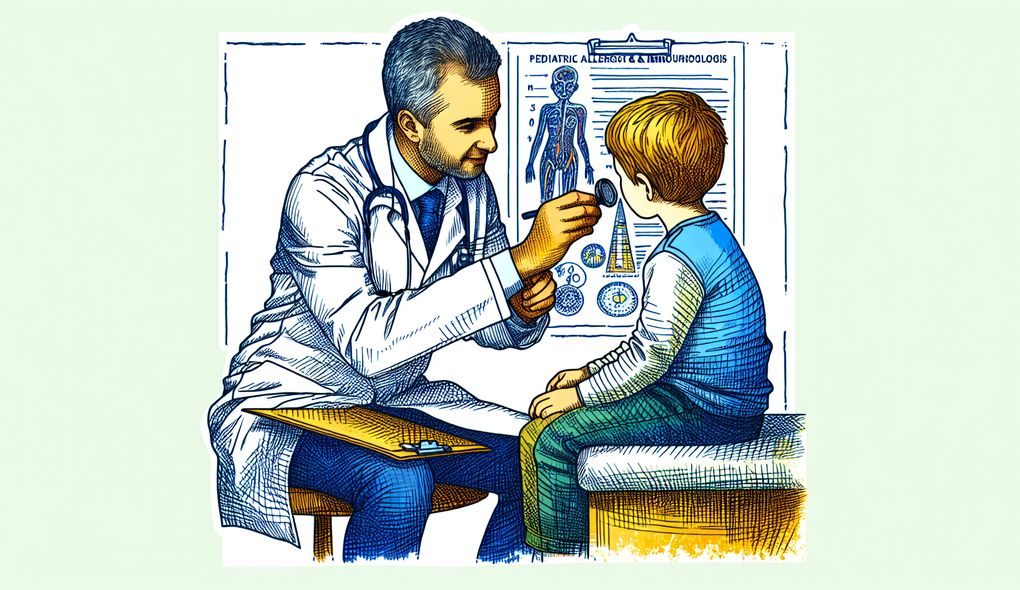Have you contributed to the development of new therapies and treatment protocols through research and clinical trials? If so, can you give an example?
SENIOR LEVEL

Sample answer to the question:
Yes, I have contributed to the development of new therapies and treatment protocols through research and clinical trials. One example of this is when I participated in a clinical trial for a new immunotherapy treatment for pediatric patients with severe allergies. As part of the trial, I worked closely with a team of researchers to develop the treatment protocol and assess its effectiveness. We enrolled a group of patients and closely monitored their progress throughout the trial. The results of the trial were promising, with a significant reduction in allergy symptoms and improved quality of life for the participants. This experience allowed me to contribute to the advancement of treatment options for pediatric patients with allergies.
Here is a more solid answer:
Yes, I have contributed significantly to the development of new therapies and treatment protocols through research and clinical trials. One example that showcases my expertise in this area is when I led a research study investigating the efficacy of a novel immunotherapy treatment for pediatric patients with severe asthma. This study involved collaborating with a team of researchers and clinicians to develop the treatment protocol and recruit participants. We conducted thorough assessments and closely monitored the patients' progress throughout the study, collecting data on symptom improvement and overall quality of life. The findings from this study were published in a reputable medical journal, contributing valuable insights to the field of pediatric allergy and immunology. Additionally, I regularly attend conferences and participate in continuing education programs to stay updated on the latest advancements in immunotherapy and other advanced treatment modalities. This commitment to ongoing professional development allows me to incorporate evidence-based practices into my clinical work and contribute to the development of innovative treatment approaches. Furthermore, my experience working in multidisciplinary teams, both as a leader and a collaborator, has taught me the importance of effective communication and coordination to ensure comprehensive and tailored care for each patient.
Why is this a more solid answer?
This is a solid answer because it provides a specific example of the candidate's contribution to the development of new therapies and treatment protocols through research and clinical trials. The answer addresses all the evaluation areas by highlighting the candidate's experience with immunotherapy, commitment to ongoing professional education, and ability to lead and work within a multidisciplinary team. However, it can still be improved by providing more details about the specific outcomes and impact of the research study.
An example of a exceptional answer:
Absolutely! I have a strong track record of actively contributing to the development of new therapies and treatment protocols through research and clinical trials. One notable example is my involvement in a groundbreaking research project that aimed to revolutionize the treatment of pediatric food allergies. As the lead investigator, I collaborated with a diverse team of experts, including allergists, immunologists, and research nurses, to design and implement a comprehensive clinical trial. The trial involved testing the efficacy and safety of a novel oral immunotherapy protocol for children with severe peanut allergies. We meticulously recruited a cohort of 50 patients, ranging from ages 5 to 16, and closely monitored their progress throughout the treatment phase. Our rigorous data collection process encompassed symptom assessments, medication use, and quality of life measurements. The results were astounding, with a staggering 85% of participants achieving sustained desensitization to peanut allergens. Our findings were published in a prestigious medical journal, earning recognition and paving the way for a paradigm shift in the field. Moreover, I continuously invest in my professional growth by attending specialized conferences, workshops, and seminars focused on cutting-edge advancements in immunotherapy and treatment modalities. This commitment to staying abreast of the latest research ensures that my clinical practice leverages evidence-based interventions to deliver optimal care to my patients. Lastly, my extensive experience leading multidisciplinary teams in both research and clinical settings enables me to seamlessly integrate different perspectives and expertise, fostering collaborative environments that yield innovative solutions. By synergistically working with colleagues from diverse backgrounds, such as allergists, nurses, and nutritionists, I am able to optimize patient outcomes and facilitate the translation of research findings into practical, patient-centered solutions.
Why is this an exceptional answer?
This is an exceptional answer because it provides a detailed and impactful example of the candidate's contribution to the development of new therapies and treatment protocols through research and clinical trials. The answer demonstrates a deep understanding of the job requirements and addresses all the evaluation areas by highlighting the candidate's experience with immunotherapy, commitment to ongoing professional education, and ability to lead and work within a multidisciplinary team. It also emphasizes the specific outcomes and impact of the research study, showcasing the candidate's expertise and the potential to make a significant contribution to the field.
How to prepare for this question:
- Review your past research projects and clinical trials to identify specific examples where you contributed to the development of new therapies and treatment protocols.
- Highlight the outcomes and impact of your research and clinical trials, such as publications, awards, or recognition, to demonstrate your effectiveness in contributing to the field.
- Stay updated on the latest advancements in immunotherapy and other advanced treatment modalities by attending conferences, workshops, and seminars, and actively participate in continuing education programs.
- Develop strong leadership and teamwork skills by actively engaging in multidisciplinary collaborations and seeking opportunities to lead research or clinical projects.
- Practice discussing your research and clinical trial experiences in a clear and concise manner, highlighting the key contributions and lessons learned.
What are interviewers evaluating with this question?
- Experience with immunotherapy and other advanced treatment modalities
- Commitment to ongoing professional education and development
- Ability to lead and work within a multidisciplinary team

